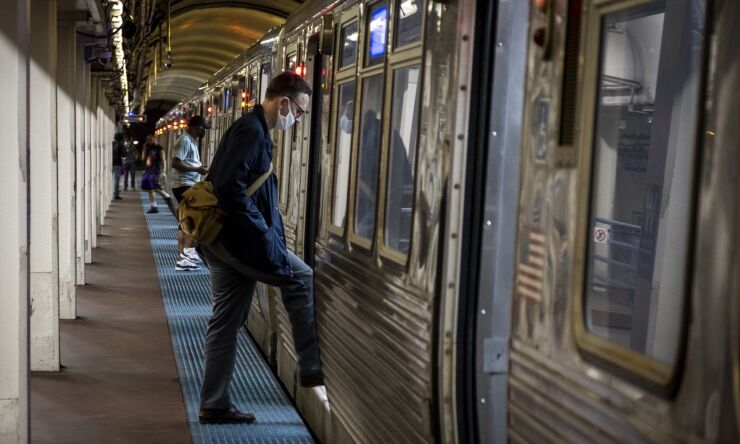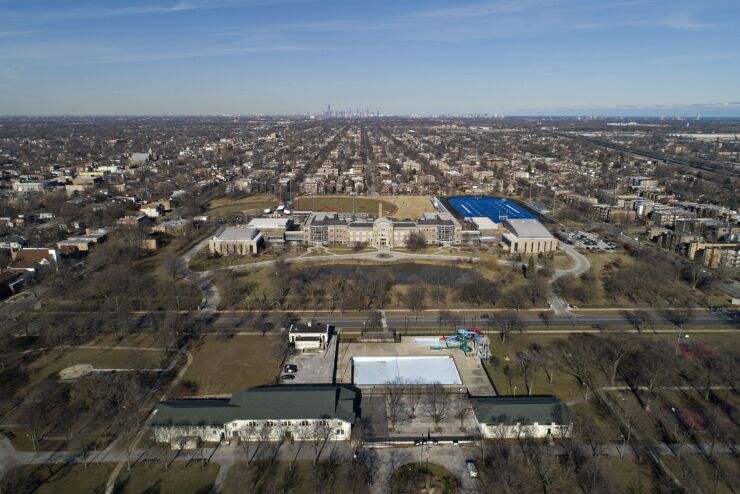While Chicago and the Illinois state government were left out, the region’s transit system and Chicago Public Schools emerged as winners in the new federal
The Illinois Regional Transportation Authority’s service boards that provide light rail, commuter rail, and bus service in Chicago and the suburbs will receive $450 million from the $14 billion earmarked for public transit in the $910 billion package President Trump signed Sunday.

The infusion of funding will help prevent what officials had warned was an Armageddon scenario of deep service cuts and layoffs, but it’s still $50 million short of the $500 million a
“While this is positive news, it will not completely cover the budget shortfall of $500 million in our 2021 Regional Transit Operating Budget. It also falls short of the $32 billion that APTA [American Public Transportation Association] and other transit across the country have called for,” RTA executive director Leanne Redden said in a statement.
CPS expects to receive a $720 million windfall from the $82 billion allocation for public education in the Coronavirus Response and Relief Supplemental Appropriations Act after sending $80 million to non-public schools as required under the package. The $82 billion provides $54.3 billion for K-12 education, $22.7 billion for higher education and additional funding at governors' discretion to offset higher costs or state aid cuts.
The $720 million is double the $343 million CPS counted on its
“These resources will allow us to make all necessary investments for our students this year and ensure essential investments can continue into next year despite anticipated revenue challenges ahead,” CPS Chief Executive Officer Janice Jackson said in a statement.
Public universities and O’Hare International Airport will also benefit from the package and Chicago and Illinois — which combined have lost billions of dollars in tax revenues because of the pandemic — are still hopeful that after President-elect Joe Biden takes office next month that aid will come to fruition.
Moody’s Investors Service in a recent report labeled the relief package a credit positive for some municipal issuers that stand to benefit, including school districts, higher education, mass transit and airport enterprises.
The package does provide an additional year to spend leftover CARES Act funds. The deadline for spending the $150 billion Coronavirus Relief Fund, which provided direct grants to states and some large cities and counties to cover pandemic costs, was extended through the end of 2021.
“The exclusion of direct aid to state and local governments from the measure passed now continues uncertainty about the steps state and local entities will take to balance their finances,” Moody’s wrote.
Chicago Public Schools
Junk-rated CPS moved fully to remote learning in March. It plans to phase in a return for students beginning with pre-school and elementary students early next year although families can opt to continue online learning. The district is facing pushback from the Chicago Teachers Union.
The infusion of funds will cover $75 million in COVID-19 related expenses for protective equipment and cleaning supplies, $42 million for technology, and $115 million for additional support staff including nurses and social workers. Additional funds are earmarked for local school grants.
Remaining aid will help cover fiscal 2022 costs including higher expenses due to the new contract struck with teachers last year, expanded pre-kindergarten and new academic programs. Cost-of-living increases for teachers and other union members carry an $80 million price tag.
“As a result of federal relief funds, the district will be able to support planned investments and help meet student needs, despite seeing revenue that falls below prior expectations,” the district said in a statement.

CPS anticipates the pandemic will negatively impact revenue for several years.
“While financial expectations are fluid, the district conservatively expects to see an approximately $300 million financial impact in fiscal 2022 compared to expectations prior to the pandemic,” CPS said.
The district warns of potential property tax revenue losses due to property tax value declines and the potential for higher teacher pension contributions should investment returns falter.
The state held public school funding steady in its fiscal 2021 budget but did not fund a $350 million scheduled increase. The state is grappling with a $4 billion gap in the fiscal year and Gov. J.B. Pritzker recently announced $711 million in cuts that spared public education but more cuts loom.
The junk-rated district received $206 million from the CARES Act signed March 27. It carried $128 million of that aid into fiscal 2021 which began July 1. CPS’s full $8.4 billion budget package includes $6.9 billion for operations, a $758 million capital plan and $711 million for debt service.
The board at its November monthly meeting approved up to $585 million of new money and refunding bond issuance but officials have not said how soon the district might tap that authorization.
Moody’s in June warned in a special report that fiscal progress was threatened by the pandemic's potential impact on state aid and a property tax levy for pensions. Moody’s rates the district four rungs below investment grade at B1 with a stable outlook. It cut its outlook from positive in May.
S&P Global Ratings in April revised the outlook on its BB rating to stable from positive. Fitch Ratings assigns a BB rating and stable outlook. Kroll Bond Rating Agency assigns BBB and BBB-minus ratings to various CPS GO bonds, with a stable outlook.
Regional transit
Leaders of the Chicago region’s mass transit agencies had warned of grim cuts in the coming months in the absence of federal help because the COVID-19 pandemic caused dwindling fare and tax revenues.
“I have never in my entire career seen a budget deficit the size of what we are talking about next year. This is Armageddon type of stuff, it's beyond doomsday,” Chicago Transit Authority president Dorval Carter Jr. told the Regional Transportation Authority of Illinois at a board meeting during a review of 2021 budgets.
The RTA’s three service boards received $1.4 billion of the $25 billion in national transit aid from CARES. They are carrying $537 million into 2021. The RTA board approved the budget at its December meeting.
The CTA, which runs Chicago city buses and rail rapid transit, has not cut service like the Metra commuter rail system and Pace suburban bus lines. It will operate on a $1.64 billion 2021 operating budget that requires $375 million in federal help to stay balanced.
Carter’s warnings were echoed by leaders of Metra and Pace.
As of Oct. 23, RTA ridership is down 72% systemwide compared to 2019 and long-term challenges abound as ridership trends are uncertain even if the pandemic eases. “As a result, the total additional funding need for 2021 through 2023, above and beyond the remaining CARES Act funding, is more than $1.8 billion,” RTA documents say.
The combined budgets for Metra, Pace, and CTA total $3 billion. About $1.15 billion of operating revenue comes from system-generated revenue primarily from passenger fares. Public funding totals about $1.88 billion and comes from a regional sales tax and state funding.
As the state grappled in recent years with its own mounting fiscal woes, it cut into funding levels and officials worry the state’s pressures endanger aid levels.
Transit funding struggles prompted S&P Global Ratings to move the outlook on its AA rating of the RTA to negative from stable over the summer. Moody’s Investors Service in May moved the CTA and RTA’s
Moody’s affirmed the CTA's ratings and moved the outlook to negative from stable on the A3 rating assigned to the CTA’s sales tax revenue bonds, and the CTA’s Public Building Commission of Chicago bonds backed by CTA lease payments, rated Baa1. Moody’s also affirmed the CTA’s federal grant receipt revenue bonds, rated A3 with a negative outlook.
Fitch Ratings rates the RTA AA-plus on its $1.7 billion of outstanding general obligation bonds and cash flow notes and assigned a stable outlook.
S&P earlier this year affirmed its A-plus rating on the second lien sales tax bonds and AA on the senior lien. Kroll Bond Rating Agency affirmed its AA-minus and AA ratings on the two liens. Both agencies assign a negative outlook.





